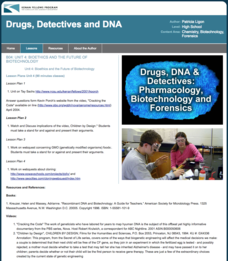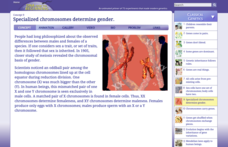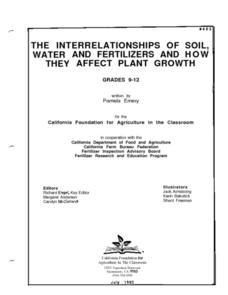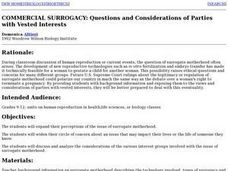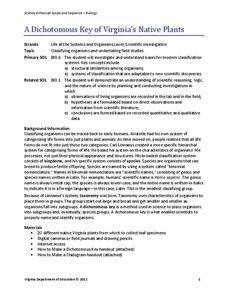Curated OER
Human Reproductive System
Teenagers take on the human reproductive systems when viewing this presentation. Labeled diagrams of each are displayed, along with one of a fetus in utero. Presented in bullet-point fashion are facts about the formation of sperm and egg...
Curated OER
What Happens in the First Nine Months?
Students explore human development using Internet resources that contain text, drawings, photos, and video about human development. They research a trimester of pregnancy then create drawings to show what is happening to the fetus during...
Virginia Department of Education
Changes in Ecosystems
How does water pollution affect the environment? Provide your class with the resources to answer this question as they learn about eutrophication and ecosystem changes. Over two weeks, they simulate the effects of pollution on the...
Curated OER
Regents High School Examination: Living Environment 2007
Environmental science enthusiasts show what they know at the end of the year by taking this full-fledged final exam. They answer multiple choice, graph interpretation, and essay analysys questions, 73 of them in all. Topics range from...
Curated OER
Bioethics: Debates in Human Genetics
High schoolers, in groups, research and prepare a debate regarding various bioethical situations. After the debates, each student prepares a ortfolio outlining their own personal opinions.
Curated OER
Reproduction, Day 1: Reproductive System
Engage Secondary Special Education students in a developmentally appropriate lesson on human reproduction. They review genital anatomy and 5 key components that comprise the reproductive cycle. Perfect for a mild to moderately disabled...
Pulitzer Center
Exploring Downstream: Water Resources
The lack of clean water is a life-threatening plight for millions of people around the world. Through an extensive WebQuest, young environment or social studies classes compare our water availability to that of the cxitizens of Ethiopia,...
Kenan Fellows
Unit 4: Bioethics and the Future of Biotechnology
What's the future of biotechnology? Explore a hot topic in the fourth and final unit in a series of Biotechnology lessons. Learners develop an understanding of the many issues in bioethics, then create an argument for or against the role...
Curated OER
Tides in the Hudson
Students view an illustration of the Hudson River watershed and identify the bodies of water shown. They discuss what happens when fresh and salt water mix. Students view a teacher demonstration of the stratification of fresh and salt...
Curated OER
Human Demographics
Students explore factors that change human population growth in a biology simulation for seven countries including the United States, China, Egypt, Germany, Italy, India, and Mexico. Factors such as age at which women begin having...
Population Connection
Where Do We Grow from Here?
Did you know that the population is expected to grow to 11 billion by 2100? The resource serves final installment in a six-part series on the global population and its effects. Scholars interpret data from the United Nations about the...
Cold Spring Harbor Laboratory
Specialized Chromosomes Determine Gender
Are you an XX or an XY? Budding scientists learn about cellular fertilization and the determination of gender in a thorough online lesson. They follow their study with a set of interactive reflection questions.
University of Florida
Protecting Our Water Resources
Teach young environmentalists to protect their planet's resources with a set of interactive experiments. Kindergartners and other youngsters learn about watersheds and the water cycle, while older elementary learners focus on fertilizer...
Curated OER
The Interrelationships of Soil, Water and Fertilizers and How They Affect Plant Growth
Students examine how different nutrients in the soil and fertilizers affect plant growth. In groups, they participate in a role play in which allows them to see the interactions of humans and plants. They also read articles and record...
Curated OER
Salt Marsh in a Pan
Students create a model of a salt marsh to discover the impact of pollution and human activities on water-based habitats including bays and the ocean. They recognize the relationship between natural and developed areas. Students impact...
Curated OER
Anatomy and Physiology
Fifth graders work in teams to play a game enabling them to identify the basic components of the female human reproductive system. They view an overhead that describes menstruation and discuss their knowledge of the female reproductive...
Curated OER
Week 3: Pollution Source and Effects
Lab groups set up an experiment to observe what happens over time in collected pond water when fertilizer, representing pollution, is added. This website does not include student lab sheets, but background information, materials, and...
Curated OER
Commercial Surrogacy: Questions & Considerations of Parties with Vested Interests
Teenagers explore the topic of surrogate motherhood. They examine the technology involved, types of surrogacy, interested groups, and current laws. Each collaborative group is assigned an interest group. They work together to develop...
Curated OER
Composting
Using 2-liter bottles, junior ecologists create composting tubes in which they place nitrogen-rich and carbon-rich materials. They observe what changes occur over two weeks' time. Provide more specific direction to your class as to what...
Curated OER
Pesticide Watch Card
Young scholars examine human health by identifying dangerous pesticides. In this agriculture lesson, students research the food production system in the United States and discuss dangers such as pesticides, chemicals and insecticides...
Curated OER
Raven Chapter 12 Guided Notes: Sexual Reproduction & Meiosis
Young biologists define reproduction vocabulary terms, answer critical-thinking questions, label a diagram of the human life cycle, and complete a chart comparing mitosis to meiosis. This is a well-balanced worksheet. Even though it...
Curated OER
Reproduction, Day 2: Pregnancy
Nearly all students have seen pregnant women and may have questions about human development. Intended for secondary students with mild to moderate mental disabilities, this lesson defines the process of pregnancy in a developmentally...
Serendip
Understanding How Genes Are Inherited via Meiosis and Fertilization
Bring the excitement of genetics to scholars with a dynamic hands-on meiosis modeling experience. During the activity, biologists follow step-by-step procedures to build chromosomes, model independent assortment, learn about crossing...
Virginia Department of Education
A Dichotomous Key of Virginia’s Native Plants
Can your class correctly classify plant species? Individuals explore native plants of the local environment and correctly classify them into their respective categories. They investigate differences in the plants and discuss similarities...









